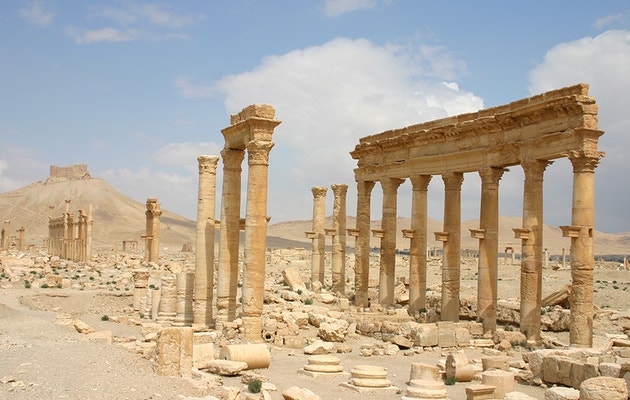A Martyr in Palmyra
August 20, 2015

Ruins of Palmyra stand in central Syria. This ancient city thrived more than 2,000 years ago as a major stop for caravans and is rich in archaeological treasure. This week, Islamic State (ISIS) murdered the city’s chief archaeologist when he refused to lead them to art works hidden in the city. © Styve Reineck, Shutterstock
The Islamic State (also called ISIS or ISIL) is a terrorist band, guilty of such crimes as blowing up innocent people at markets and mosques. The group also slaughters people by the thousands, people who resist, people they consider to be “infidels” (religious nonbelievers).
Like so many other terrorists, the Islamic State needs headlines, and they need money to continue their activities. Typically, plundering Syrian and Iraqi oil gets ISIS enough money to fund their campaign of terror. But oil wells are merely stacks of cash. Stealing and selling oil doesn’t make the news and it does little to infuriate or inspire. The Islamic State touches a nerve, however, with their next most profitable way to finance their war: Antiquities. Antiquities as in ancient structures, priceless historical objects, the very record of human history. The destruction of priceless antiquities gains ISIS huge amounts of news coverage. It serves as a tool for recruitment, appealing to angry and desperate young people eager to “make a difference” in the world.
So the terrorists—like bulls in civilization’s china shop—destroy ancient ruins and show their actions on on social media. But they are clever. Behind the scenes, the Islamic State protects the true gems of the ancient world, and they sell them on the black market (illegally). It may be that by destroying large antiquities that are not very portable—such as buildings and statues—they increase the value of the more portable items they want to sell. Of course, those gems aren’t always easy to find.
Enter 83-year old Syrian archaeologist, Khaled al-Asaad. Asaad’s hometown of Palmyra is an ancient caravan stop and home to some of the world’s greatest archaeological treasures. The Islamic State captured Palmyra—and its caretaker, Asaad—in May 2015. Since then, the terrorists had attempted to force Asaad to reveal the locations of his city’s truly priceless items that had been hidden before the city fell to the terrorists. Tired of his obstinate refusals, the Islamic State murdered Asaad on Tuesday, August 18. They cut off his head in a public square. They hung his decapitated corpse by the wrists from a traffic light. Asaad died a true martyr. Not a martyr to Islam, for his killing had nothing to do with Islam or religion. But, a martyr to greed fueled by the tragically misguided intentions of the Islamic State.
Other World Book articles:


